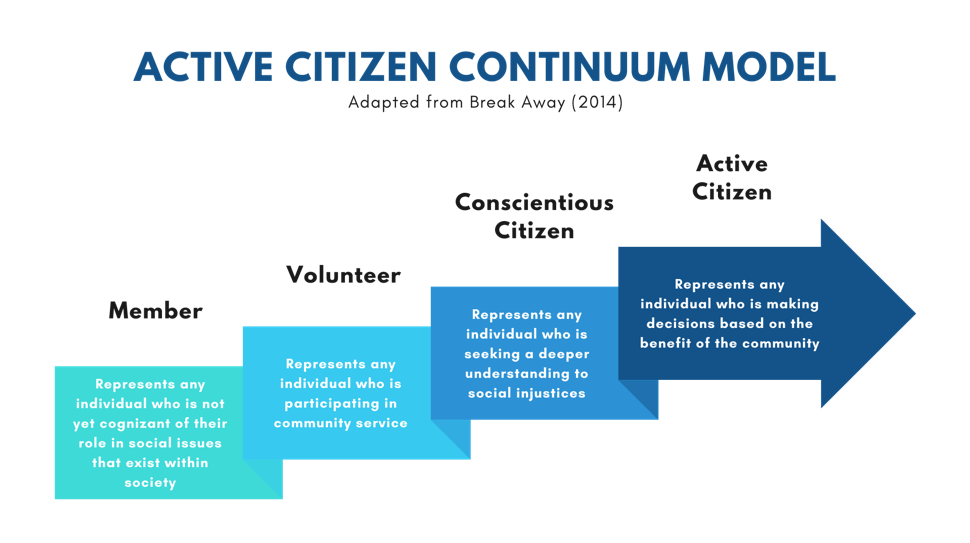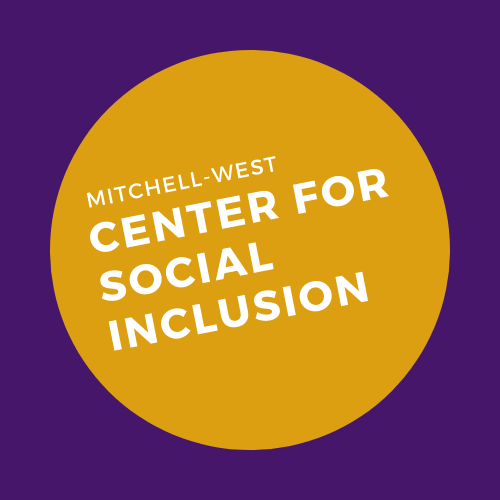A Focus on Civic Engagement, Advocacy, and Justice
Civic engagement or civic participation is vital for a democracy to survive and thrive. Civic engagement involves collective action to address issues of public concern, working to make a difference in civic life within a community, and developing the knowledge and skills to make a difference. There are a range of activities that constitute civic engagement including voting, individual volunteering, and team-based community service. While some of these activities are done outside of educational experiences, many are embedded within a university’s larger experiential learning efforts.
Active Citizen Continuum Model
The development and transformation of a volunteer’s perspective on their place in society can be reflected in the four components of the Active Citizen Continuum (Break Away, 2014c). Based on this model, the concepts of experiential education and direct service contribute to the development of an active citizen. Movement along the continuum occurs through questioning social issues, developing and understanding, and implementing action to address the issues. While growth along the continuum is the goal, active citizenship can look different for each person.

Userve
UServe is an interactive civic engagement program at UNA that involves students in hands-on community service. In premise, UServe was devised as a way to address broader issues within the community while engaging students in public outreach activities. The UServe model recognizes the comprehensive nature of creating a socially active citizen. Inherently, UServe embodies education around a social issue, training from the organization that deals directly with the social issue, direct service with the organization, and a reflection process in which the student participates and engages in their own thoughts and feelings about their service. Thus, students gain a transparent understanding of the ways that their service is embedded within the social context of the community where they live and engage with daily. Overall, the goal is to affect the capacity, capability, and competency of the individual, organization, and community.

The theme of each UServe is directly linked to needs within the local community and the interests of our students. However, because of the nature of UServe, each month is focused on a different project such as food insecurity, disability support, homelessness, youth mentoring, intimate partner violence, and Alzheimer’s. Therefore, students are able to determine which project amplifies the impact that they want to make. In this context, students are able to commit their time to a project that magnifies their influence, benefits the community, and is sustainable in terms of time, commitment, and financial investment.

Campus Partners
UServe is dependent on active and effective partnerships within the campus community and local community. Therefore, the UServe model started as an intra-institutional collaboration between the Mitchell-West Center of Social Inclusion and Community Service and Outreach within Student Engagement at UNA. This partnership extended to UNA Housing and Residence Life and has greatly benefited from their support and commitment to co-curricular opportunities and engagement.
Pivoting During COVID-19
The overall goal of UServe is to address problems within the community while also addressing barriers for students accessing those opportunities. COVID-19 has presented additional barriers for our community, nonprofit organizations, and service learning programs. This semester we moved from in-person programming to virtual programming. In October, our program centered on understanding poverty among college students and we offered our ReThink Poverty Simulation.
November is Native American Heritage Month so we will be joined on Thursday, November 12 on Zoom from 6:00 pm – 7:00 pm with Sacred Way Sanctuary who will provide us with a better understanding of the issues and challenges that Native Americans face as well as tangible ways that individuals can advocate for them. There will be a reflection process as well as action items included that participants can leave with. In addition, we will have a display in Collier Library throughout November featuring Native American arrowheads courtesy of UNA’s Department of Physics and Earth Sciences. We will also have information and artifacts from the Florence Indian Mound Museum, the Muscle Shoals National Heritage Area, the Alabama Chapter of the Trail of Tears Association, and Sacred Way Sanctuary.

Native American Heritage Month is a commemorative month celebrated every November to pay tribute the many sacrifices, contributions, and achievements of Native American people. We recognize Native Americans as the original inhabitants, explorers, and settlers of the United States. We honor the rich ancestry, traditions, and culture of Native American people, and acknowledge the work that needs to be done to ensure the rights and recognition of Indigenous Peoples across America.


